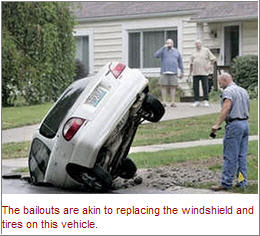 The WSJ reports about The Bailout Endgame:
The WSJ reports about The Bailout Endgame:
It’s hard to know whether the unfolding drama with Bank of America and Citigroup Inc. represents history repeating itself as farce, or whether the markets have a few more go-rounds with tragedy first. Sure, shares are higher on the day on news that the U.S. Treasury has driven an armored truck full of large bills to the front of headquarters, even as similar amounts are being sent into the incinerator in a back office somewhere. But many see the situation as untenable, believe the government is throwing good money after bad, and believe the resolution will look similar to a liquidation.
Citigroup and Bank of America are receiving another round of funding to shore up their capital bases even though the outlook remains depressing. Economic weakness, the fractured real estate market and the horrific-looking balance sheets of these financial-services companies are likely to translate to losses for an ongoing period of time, until the market somehow recovers, or the institutions collapse.
“We’re funding operating losses and we’re only buying time,” says Christopher Whalen of Institutional Risk Analytics.
Citigroup is receiving at least $45 billion to stabilize itself after announcing an $8.3 billion loss amid plans to split into two businesses. Bank of America, meanwhile, reported big losses and nailed down plans to receive $20 billion from the government to handle losses related to its acquisition of Merrill Lynch.
But when does all of this end? That’s the germane question here — and to some, it points to an eventual takeover by the Federal Deposit Insurance Corp., where the bank deposits and certain other assets are sold off, piecemeal, to other banks, and the company’s debt remains with a shell company. Debtholders eventually lose a ton of money in bankruptcy.
“The debt must be reduced — if it means the debtholders lose money along with shareholders and depositors it must occur,” says Chris Wang, portfolio manager at hedge fund SYW Capital Management LLC in New York, who has short positions in the financial sector. “It’s not politically viable to let depositors lose money so it’s only through debtholders losing money can credit flow again. Then, we’ll be able to let companies that bought them operate in a stronger situation, because they’ll be able to conduct business.”
That all sounds incredibly easy on paper, but one only need look at the wrangling that has accompanied the slow spiral into nothingness of the U.S. automakers to see that debtholders won’t go gently into the night, particularly if the perception remains that the underlying company in question still remains viable (which is how people see Bank of America and its stronger brethren, J.P. Morgan Chase).
But Campbell Harvey, professor of finance at Duke University says taxpayers shouldn’t have to subsidize a bad bet by Bank of America when it purchased Merrill Lynch at $29 a share. “We’re in a situation where the government is continuing to bail out mistakes and continuing to throw good money after bad and then take a back-seat position — they have to stop or [management] will continue to do this,” he says.
For his part, Mr. Whalen believes the industry has reached an inevitable point; Citigroup’s restructuring into two units will only buy a bit of time. “You’re basically going to liquidate these guys and break them up into bite-sized pieces by geography,” he says. “If you want the economy to recover, you go to US Bancorp on down and you tell them you’re going to give them more TARP money, on more concessionary terms than Citi or B of A, and they can use that to buy other banks, and breathe life into these moribund assets.”
[Emphasis added]
Read that highlighted paragraph again. Here is finally an idea that makes sense. Support the strong firms so that they can buy up the weak and incompetent losers and get the banking system moving again. That would be a sound direction to pursue—and not only in the banking sector.

Comments 1
How do yu think BAC became so moribound? Buying the toxic assets Country Wide and Merrill.
So how wud it be any different if a lower tier bank bought its big bretheren.
Look my $600K home is now only worth $210K (& cant be sold). Somebody needs to eat that. It should be the shareholder and the debt holder. Not give them a $29 free rideon my public back. I only
paid $170K but my neigbhors all paid $400K to $550K and month by month another one goes vacant. Somebody made all that money at the time of settlement.
When the company I worked for went belly up nobody came it and gave us a fat gov check for my worthless stk. This entire situation was intentionally set in motion to raid the "frig" of the gov as the last resort to break entitlements. In fact, Wall Street wants Soc Sec because that is the last pot of gold untapped by the big money guys to keep their lifestyle afloat. They've sucked everything else dry. With salaries being wratched down as more white collar is sucked off shore that assets are worst then toxic. Those homes will never see $600K again much less $300K other then inflation. Perhaps that is the way out. Hyperinflate so that the toxic values are now easily purchased. Otherwise the 12 trillion buck housing mkt is a bottomless pit. So 20 billion here and 20 billion there is never coming back. Throw in the cost of borrow that from China/Japan and that a hole equivalent to where the credit cards have their customers with that 29% Plus usury rate.